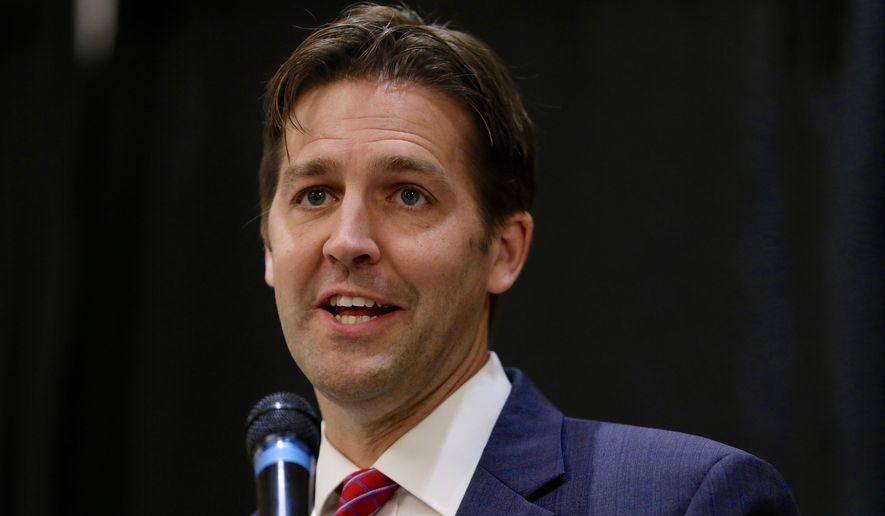Far from irreparably fracturing the GOP, Donald Trump is quickly winning the backing of many of the party’s top elected officials, with senators returning to Washington this week pledging their support for him as their nominee.
Outside of Washington, Republican voters are likewise warming to Mr. Trump, and are decidedly cool to calls to recruit a third-party alternative to Mr. Trump and likely Democratic nominee Hillary Clinton, saying there’s too much at stake to give Democrats another four years’ control of the White House.
“I think it’s a great idea, but not for this particular election,” said Gregg Mattox, standing outside an Omaha polling station in Tuesday’s GOP presidential primary. “You split the vote and you’re going to get a liberal Supreme Court and Hillary Clinton in the White House for four years. The timing is just bad.”
A week after he chased his remaining opponents from the race, Mr. Trump is steadily — if somewhat shakily — earning over Republican voters and lawmakers who supported someone else in the bitter primary.
“I’m for the nominee of the party. If it is Donald Trump, I’ll be supporting him wholeheartedly,” Senate Majority Whip John Cornyn, Texas Republican, told reporters at the Capitol, where lawmakers reconvened for the first time since the Republican National Committee chairman declared Mr. Trump the presumptive nominee.
Even Sen. Marco Rubio, who ran against Mr. Trump for the nomination, said despite deep policy differences, he’ll stick by his pledge to back the GOP’s eventual nominee, saying voters have chosen the billionaire businessman.
“I stand by the things that I said, but I’m not going to sit here now and become his chief critic over the next six months because he deserves the opportunity to go forward and make his argument and try to win,” the Florida Republican said on CNN.
Mr. Trump still only has one formal endorsement by a sitting senator — that of Sen. Jeff Sessions, Alabama Republican. And pundits had predicted Mr. Trump’s ascension to the nomination would cleave the GOP, leaving it too divided to win in November, and possibly wounding it well beyond the election.
But polling shows Republican voters are already coalescing around Mr. Trump now that he’s the only remaining active candidate.
Indeed, calls to recruit a third-party alternative to Mr. Trump — made most prominently by Sen. Ben Sasse, Nebraska Republican, weren’t playing well, even in Mr. Sasse’s home state.
Republican Gov. Pete Ricketts set the tone Friday by appearing with Mr. Trump at a rally that drew about 3,500 supporters to Eppley Airfield. Even though Mr. Ricketts’ parents — his father Joe Ricketts is the founder of TD Ameritrade — have spent an estimated $5.5 million to defeat the real estate mogul, the governor said he would support the party’s nominee.
Mr. Ricketts’ predecessor, former Republican Gov. Dave Heineman, also took the stage with Mr. Trump, saying the billionaire businessman won the nomination “fair and square” and called Mr. Sasse’s third-party scenario a “fantasy.”
“Sen. Sasse is a good friend of mine. We both live here in Fremont. But it’s fantasy world,” Mr. Heineman told The Washington Times. “I don’t believe there’s going to be a third-party candidate. It’s hard to get on a ballot. How would you fund the race? Who is the so-called white knight?”
Mr. Sasse is one of several high-profile holdouts who’ve said they cannot get on board with Mr. Trump. Others include Sen. Ted Cruz, Mr. Trump’s closest challenger for the nomination, and Sen. Lindsey Graham, another former candidate.
“I’ll just write somebody in or just skip the presidential pick,” Mr. Graham said.
He refused to say that he wanted Mr. Trump to lose, and also wouldn’t say that Mrs. Clinton would be a better choice for president.
“I’d prefer … neither one of them,” he said. “It’s pretty odd to say I want him to win the White House when I can’t vote for him.”
House Speaker Paul D. Ryan has also withheld his support for now, and has even offered to step down as the presiding officer at the Republican National Convention in July in Cleveland.
Mr. Trump plans to meet with Mr. Ryan and Senate Majority Leader Mitch McConnell, as well as other lawmakers, Thursday in Washington. But he has said that he doesn’t think the GOP leadership needs uniting behind him to win the White House.
Sen. Bob Corker, Tennessee Republican, said he expects the vehemence of the #NeverTrump crowd on Capitol Hill to fade.
“When I hear people say never, I say, ’Chill. Over the course of the next several months, it is very possible that people could view this in a very different way,” said Mr. Corker, the chairman of the Senate Committee on Foreign Relations who has provided Mr. Trump guidance on foreign policy.
Sen. Thom Tillis, a North Carolina Republican who backed Mr. Rubio in the primary race, said he was supporting the presumptive nominee and believed Mr. Trump would unite the party.
“All this rhetoric about the party falling apart and we can’t get ready for the general election is exactly what I heard in 2014 when I went through an eight-way primary, and we won against all odds,” he said. “The same thing can happen with Donald Trump.”
Mr. Tillis said it was normal for a lot emotions to get stirred up during a tough primary. “With the passing of time, most of that goes away, and I think we’ll be in good shape by November,” he said.
⦁ Valerie Richardson reported from Omaha, Nebraska.
• S.A. Miller can be reached at smiller@washingtontimes.com.
• Valerie Richardson can be reached at vrichardson@washingtontimes.com.




Please read our comment policy before commenting.